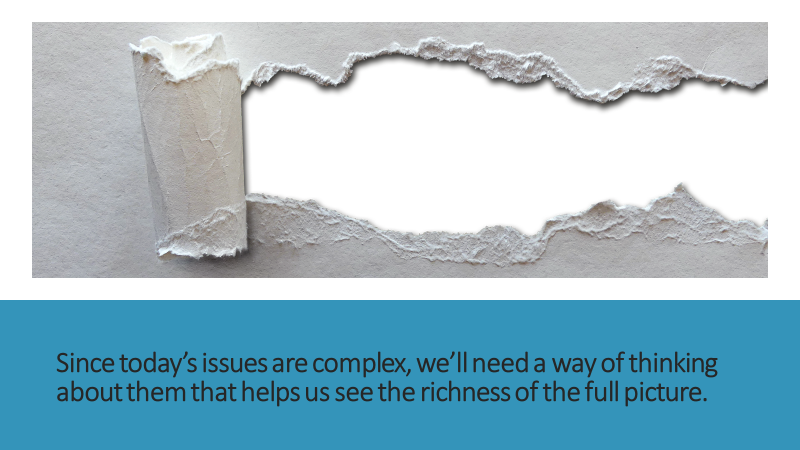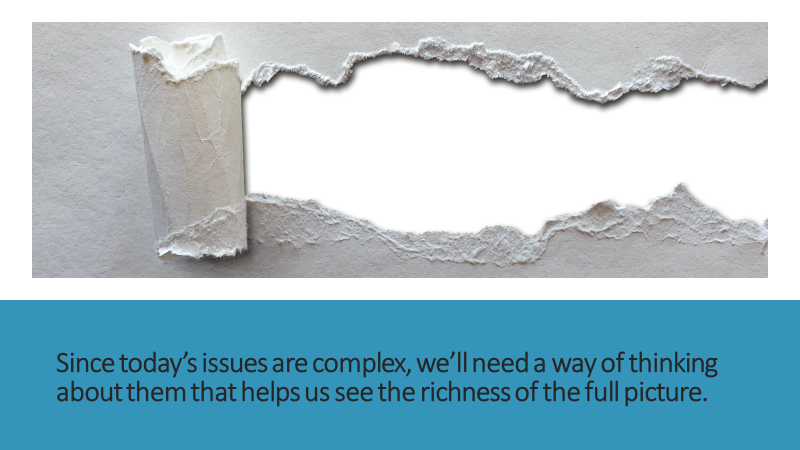
By Linda Fisher Thornton
Welcome to Part 1 in the series “Ethical Thinking and Decision Making for Leaders.” Ethical decision-making is not simply a task. It is the process of analyzing and understanding multiple connected variables in a changing context AND applying ethical values to make responsible choices. It requires doing the work to understand issues clearly before making decisions or taking action. In each post in this series, I’ll explore one aspect of this complex, connected process. Today I’ll focus on the importance of deep thinking.
Deep Thinking
Ethical thinking requires much more than just knowing and following our values. I’ve written about the trap of shallow thinking and how important it is to intentionally “wade into” the depth of issues to fully understand them.
Why is deep thinking so important?
- Complex issues involve connected systems which are undergoing constant change
- Complex issues cross borders and boundaries
- Complex issues can’t be understood from one or two perspectives
When we dig into issues and explore their depths, we gain insights that we would otherwise miss. Complex issues just can’t be deconstructed and understood using shallow thinking. The meaningful insights are only found below the surface.
Shallow Thinking and Shallow Breathing
What happens when our approach is too shallow? Think about how easy it is to start using shallow breathing without being aware that we’re doing it. This can happen when we’re stressed or anxious, and it can impact our well-being. We may be unaware that we are using shallow breathing until someone notices we’re turning pale and tells us to BREATHE.
We can medically treat people who are having trouble breathing. But what do we do about thinking that is starved for depth, context and complexity?
When we use shallow thinking, that impacts the “well-being” of our decision making, leading to false conclusions and ethically problematic decisions. It’s almost as if when we use shallow thinking, our decision making is getting less oxygen.
What Ethical Thinkers and Leaders Don’t Do
- Survey issues at the shallow level and make bold statements without all the information
- Attack the statements or decisions other people make without doing the deep thinking required to understand the complexity of the issues
- Blame others for being “wrong” without trying to understand their perspective or the data that backs it up
What Ethical Thinkers and Leaders Do
- Ethical thinkers and leaders do the deep thinking
- They ask for input and listen to what other people see and believe
- They wade into the depths of issues to understand them clearly before they make decisions
- They struggle through a tangled web of complex information to find the truth
In the airline safety briefing before a flight, we are told to “put on our own oxygen mask first, then assist other passengers.” Similarly, we need to do our own deep thinking before we direct others. When we do the deep thinking, we set the tone for those we lead to do the same.
Stay tuned for Part 2 in the Series!

Unleash the Positive Power of Ethical Leadership
© 2009-2023 Leading in Context LLC

That’s a good question. I think any complex problem is worth thinking deeply about in order to reach an ethical and effective outcome. Even a seemingly simple decision, like what kind of paper to order, has sustainability implications. Is that paper you’re considering made from sustainably sourced and harvested trees?
LikeLike
I really like your reasons for why deep thinking is so important. I think this is one of the skills that isn’t talked about as much as others for leaders, but very important to understand. I liked how you used the correlation of shallow breathing in this article as well. Do you always follow this process to ensure you are giving deep thought to higher level problems? How do you determine if a problem brought to you by those you lead is worth delegating, or thinking deeply about? Thanks for sharing this article. I’m looking forward to part 2. 🙂
LikeLike